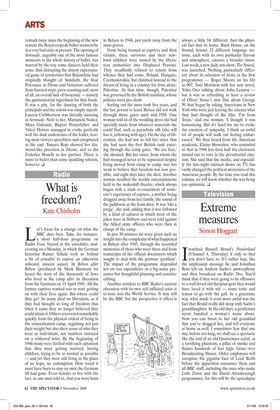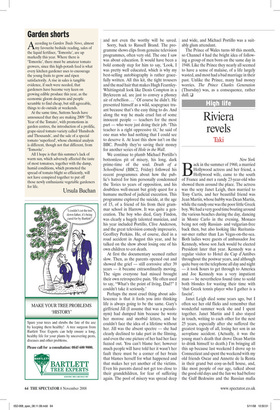Extreme measures
Simon Hoggart
Iwatched Russell Brand’s Ponderland (Channel 4, Thursday) if only so that you don’t have to. It’s rather lazy, like the unpleasant message he and Jonathan Ross left on Andrew Sachs’s answerphone and then broadcast on Radio Two. You’d think that if they were going to be offensive to a well-loved old thespian gent they would have laced it with wit — some tonic and lemon to go with the gall. In a gruesome way, what made it even more awful was the fact that Brand really did sleep with Sachs’s granddaughter. In the old days, a gentleman never bandied a woman’s name about. Now you can boast to her old granddad that you’ve shagged her, and tell everyone at home as well. I sometimes fear that one day, before too long, we shall see a spectacle like the end of an old Quatermass serial, as a terrifying phantom, a pillar of smoke and flames hundreds of feet high, forms over Broadcasting House. Older employees will recognise the gigantic face of Lord Reith before the apparition consumes them and all BBC staff, including the ones who make Little Dorrit and the David Attenborough programmes, for this will be the apocalypse and not even the worthy will be saved.
Sorry, back to Russell Brand. The programme shows clips from genuine television programmes, often very old. The one I saw was about education. It would have been a bold comedy step for him to say, ‘Look, I was pretty well educated, which is why my best-selling autobiography is rather gracefully written. All this kit, the tight trousers and the mad hair that makes Hugh FearnleyWhittingstall look like Denis Compton in a Brylcreem ad, are just to convey a phoney air of rebellion ... ’ Of course he didn’t. He presented himself as a wild, scapegrace truant because that’s the easy thing to do. And along the way he made cruel fun of some innocent people — teachers for the most part — who were just doing their job. ‘This teacher is a right oppressive tit,’ he said of one man who had nothing that I could see to deserve it. At least this show isn’t on the BBC. Possibly they’re saving their money for another series of Hole in the Wall.
We continue to plumb Michael Portillo’s bottomless pit of misery, his long, dark prime-time of the soul. Death of a Schoolfriend (BBC2, Friday) followed his recent programmes about how the public’s hatred for him personally condemned the Tories to years of opposition, and his doubtless well-meant but grisly quest for a humane method of judicial execution. This programme explored the suicide, at the age of 15, of a friend of his from their grammar school in Harrow. It was quite a generation. The boy who died, Gary Findon, was clearly a hugely talented musician, and his year included Portillo, Clive Anderson, and the great television comedy impresario, Geoffrey Perkins. He, of course, died in a road accident in August this year, and he talked on the show about losing one of his own children to cot death.
At first the documentary seemed rather slow. Then, as the parents opened out and showed the grief — still corrosive after 39 years — it became extraordinarily moving. The signs everyone had missed brought their own retrospective pain. ‘He often used to say, “What’s the point of living, Dad?” I couldn’t take it seriously.’ Perhaps the most cruel thing about adolescence is that it fools you into thinking life is always going to be the same. Gary’s girlfriend Jill (I assume that was a pseudonym) had dumped him because he wrote her morose and morbid letters, and he couldn’t face the idea of a lifetime without her. Jill was the absent spectre — she had clearly declined to take part in the filming, and even the one picture of her had her face fuzzed out. You can’t blame her; however much people will have told her it wasn’t her fault there must be a corner of her brain that blames herself for what happened and that makes her yet another of the victims. Even his parents dared not get too close to their grandchildren, for fear of suffering again. The pool of misery was spread deep and wide, and Michael Portillo was a suitably glum attendant.
The Prince of Wales turns 60 this month, so Channel 4 had the bright idea of following a group of men born on the same day in 1948. Like the Prince they nearly all seemed to have a sense of malaise, of a life largely wasted, and most had a bad marriage in their past. Unlike the Prince, many had money worries. The Prince Charles Generation (Thursday) was, as a consequence, rather dull. ❑



















































































 Previous page
Previous page